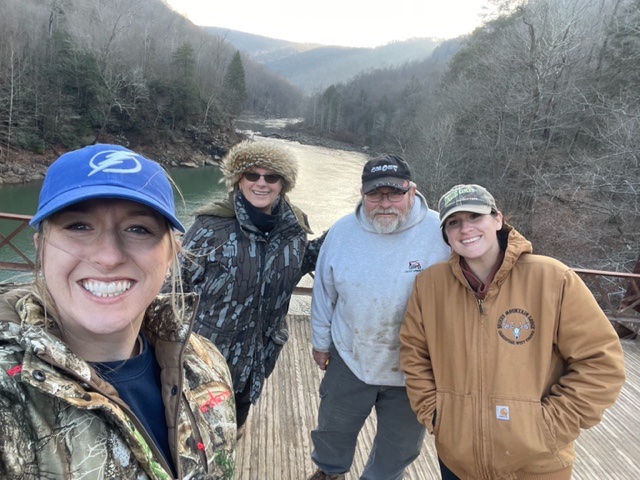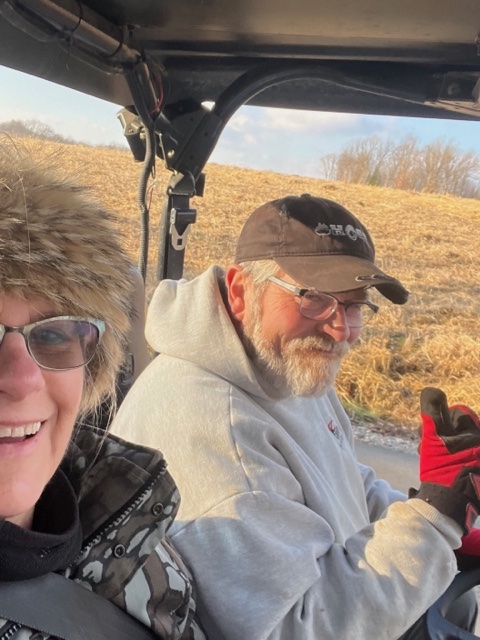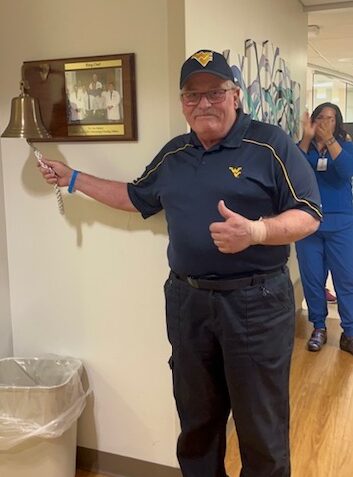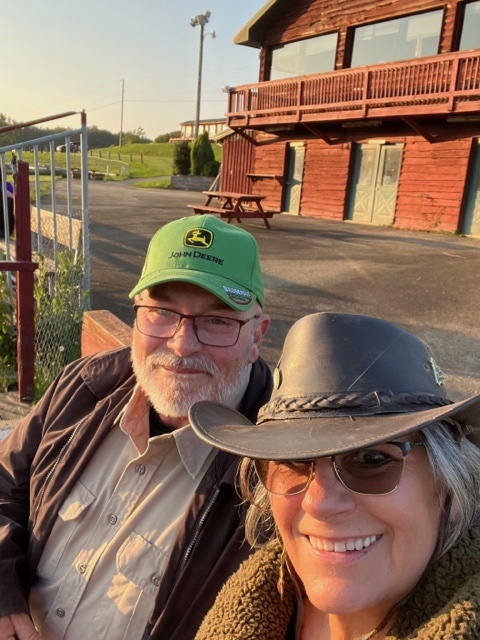By Mike Knecht
Mike Knecht retired from his career as an electrical contractor and business owner in 2019 and spent the following year traveling through the United States and Africa. In early 2023, he and his wife, Lois, sold their home in Maryland to live full-time in their vacation/retirement home in West Virginia. Mike enjoys a wide variety of activities from hobby farming on his 150-acre mountain-top property, to visiting his daughters and grandchildren on both coasts.
My diagnosis
In March of 2023, I was not feeling well. I was sluggish, easily fatigued, and was having recurring headaches. During my annual physical at the end of January, my blood work showed that my sodium level was a bit low, so my physician modified my medication to address it. The doctor said that I would need to take that prescription for a few weeks, get my blood work done again, and go from there.
During those few weeks, I went to California to visit my daughter. While I was there, my headaches became more persistent, and my fatigue was constant. When I returned home, my sodium level was even lower. Within a few days, I went to an urgent care facility and the doctor took a chest X-ray because he was concerned that I might have pneumonia.
The X-ray indicated a mass in the left side of my chest. The doctor said I should be admitted immediately to the hospital since my low sodium level put me at risk of having seizures. I spent seven days in the ICU trying to get my sodium level under control. They first did several scans and determined that I had lung cancer, but I had to wait to do a biopsy until my sodium level stabilized. The biopsy would determine the type of lung cancer I had and the treatment options.
Beginning treatment
My biopsy indicated I had small cell lung cancer (SCLC) and that I was at stage 3A (limited stage). I met with an oncologist at the Mary Babb Randolph Cancer Institute at West Virginia University Hospital who laid out my treatment plan. The oncologist recommended four three-day chemotherapy sessions that would take place three weeks apart and radiation. I also needed to meet with a radiation oncologist to determine the radiation treatments that would accompany the chemotherapy. The radiation oncologist gave me the choice of 30 once-a-day radiation treatments or 15 twice-a-day treatments. I opted for the twice-a-day regimen. Both doctors were very optimistic that I could be treated in a curative fashion and that with this regimen, my prognosis was very favorable.
I had several side effects throughout my treatment but fortunately, none were unexpected, and all were relatively minor. The treatment and follow ups from my medical team were exceptional. I always felt I was in good hands and that they genuinely cared for me and my health.
Relying on my faith, family, and community
My SCLC diagnosis came as a shock to me, as I had been relatively healthy my whole life (66 years). It was not until my admittance to the ICU that I was ever admitted to a hospital.
I am a spiritual person, and I drew strength from my beliefs. I never asked, “Why me?” or “How could this happen to me?” Instead, I knew that I was willing to do what I needed to do to beat this and to maintain the positive attitude I think is important in life.

My family, while upset with my diagnosis, has been encouraging to me in every way. All three of my daughters came to West Virginia to help their mom, spend time with me, and accompany me to my treatments. The love of my family was instrumental in me being able to maintain a positive outlook and attitude.
All through the treatment process, I also kept my circle of friends and family updated on how I was progressing. This wasn’t because I was looking for sympathy–but because I felt that people wanted to know how I was doing but might have been hesitant to ask for fear of hearing bad news. The concern my friends showed was astounding and gave me so much strength while I was in treatment.
I also cannot discount the power of prayer for me. My church family placed me in daily prayer, as did many of my friends and family. I believe that the power of the prayers offered up by all of them and by myself were a huge part of my navigating the treatment path so well.
Learning about SCLC and connecting with GO2
After my initial diagnosis, I was able to learn more about SCLC than I ever thought I would. I spoke to my medical team and other healthcare professionals and read many articles that covered treatment processes and options, survival expectations, and personal stories. Learning about my diagnosis and treatment allowed me to better understand what my body was going through and helped me make better decisions about my treatment options. It also helped me to set realistic expectations about my treatment experience and the potential progression of the disease.
At this time, I was also introduced by a friend in the medical profession to GO2 for Lung Cancer and Amy Kampschroeder who leads GO2’s SCLC program. I wish that would have occurred earlier in my cancer battle, as the encouragement and information that I gleaned from GO2 was quite helpful with its many resources.
Good news from my latest scans
On August 14, 2023, I underwent a CT scan and an MRI to determine how effective the treatments have been. I waited anxiously for a couple of days until my oncologist appointment to receive the results. I am happy to report that the cancer mass shrunk, and none was found anywhere else. I have since scheduled the preventative treatment known as Prophylactic Cranial Radiation (PCI) for October.
A realist’s new lease on life
I am a realist. I understand that this type of cancer may return, and that eventually it may become untreatable. However, I feel I have a new lease on life since my diagnosis. I have been given some more time to do things that are important to me: visit family and friends to let them know how much I value them, have fun, enjoy life, and help others.
I have adopted the mantra that was expressed by musician and songwriter, Warren Zevon, when asked about how he handled his terminal diagnosis of mesothelioma 20 years ago. He told David Letterman in an interview that a diagnosis like that makes you “enjoy every sandwich.” When I first heard him say this, I thought we should always be that way, but life tends to overwhelm you with distractions, and we take too much for granted. It is my hope now that I don’t let that happen to me.




Well written and said! We are all rooting for you. Your positive outlook and attitude is inspiring!
Well done Mike! we are all inspired by your strength and progress. I will enjoy every sandwich.